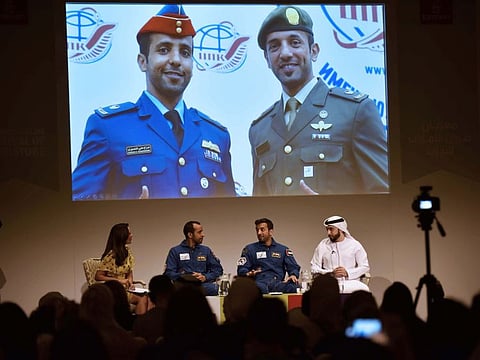UAE astronauts open up about challenges in race to space
Hazzaa and Al Neyadi pull crowds at Emirates Airline Festival of Literature in Dubai

Dubai: The UAE’s first astronaut Hazzaa Al Mansoori on Saturday spoke about his challenges in the race to space at the Emirates Airline Festival of Literature in Dubai.
Addressing a session titled ‘The UAE Astronauts Return’, he said he wanted “to go to the stars” as a child but initially felt it was a distant dream.
He became a UAE Air Force pilot but “I never let go of my dream” to become an astronaut. When the UAE in 2018 announced its mission to the International Space Station (ISS), Al Mansoori applied as one of the 4,022 candidates.
Hazzaa and Sultan Al Neyadi, who also spoke at Saturday’s session, were announced as the first two Emirati astronauts. Al Neyadi, who served in the UAE Armed Forces, was the backup candidate for the mission to the ISS.
Huge responsibility
Hazzaa said he felt a sense of “huge responsibility and privilege” to represent the UAE on ISS during his eight days in space in 2019.
He explained the difficult training process, which included tests in Russia and learning Russian, and staying in quarantine for two weeks.
“I couldn’t hug my children for two weeks… I could only see them and speak to them from behind the glass [barrier]. It was difficult to keep smiling,” he said.
But Hazzaa wanted his four children – three sons and a daughter – to be there as “it’s important for the next generation. I believe when they observe things this way, they will be inspired and this energy will be with them for the rest of their lives”.
Challenges of space
Once on board the ISS, Hazzaa had to adopt to the microgravity in space, which makes muscles weaker, harder to taste food and changes how blood and fluids move inside the body.
He worked for around 12 hours a day inside ISS (taking a one-hour break), carrying out science experiments and research, and holding live sessions with officials and students.
When Hazzaa returned to Earth in October 2019, he couldn’t walk for three days because his body had to readjust to the planet’s gravity.
Journey continues
“The dream that I had, and the dream that the UAE leadership had before me, was achieved. And we will continue this journey,” Hazzaa said.
Al Neyadi also spoke about his challenges, including the physical training and psychological pressure of being the back up for the mission. “It’s very important to have a back up because you can’t jeopardise the mission if the [primary] astronaut can’t go, if he is sick. But I had no back up,” Al Neyadi said.
Slim chance
Also sharing insights of the mission during the session was Saeed Karmostaji, the manager of the UAE astronauts, who revealed that there was just a 0.007 per cent chance of getting selected as the first UAE astronauts between all candidates. Finalists were also put through gruelling physical and psychological tests and interviews.
All three speakers answered questions from children and adults at the end of the session.
The candid Q&As
What did you find hard to do in space that’s easy to do on Earth? Tie my shoelaces (Hazzaa)
How do I become an astronaut? Stay healthy, work hard, and listen to your parents (Al Neyadi)
Does it smell like burnt steak in space? If you’re taking about inside ISS, there’s not much smell. Sometimes there is a smell like burnt steak because of the radiation is space reacting with the metal parts of spacecraft. In space itself, there is no smell – it’s a vacuum (Hazzaa)
Can a person who cannot hear become an astronaut? Nothing is impossible. One day, we will find solutions to many challenges that exist today (Hazzaa)
What IQ was required of the candidates for the mission? That’s confidential, but it’s “a very high number” (Karmostaji)



